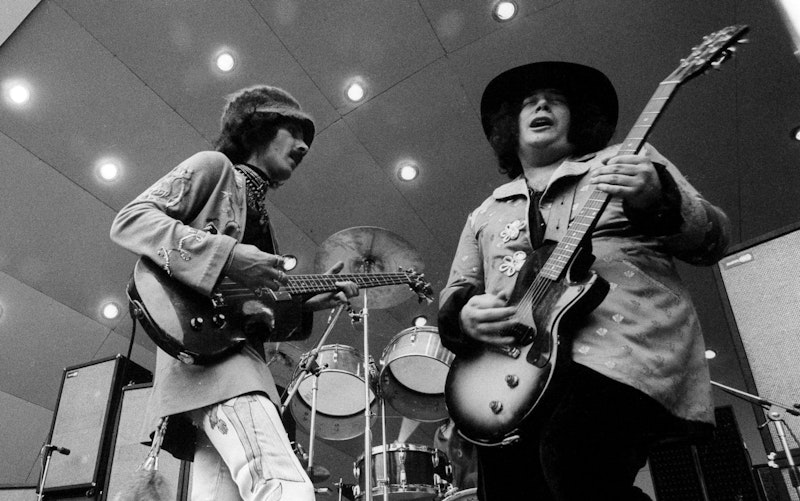“Mountain is playing at Frenchy’s, tonight!” The call came from a musician friend on February 18th in 1981. My initial reaction was that his claim had to be total bullshit.
“You’re not talking about the Mountain, with Leslie West?”
He was, and it turned out to be true.
I was skeptical because I’d been to Frenchy’s. In the early-1960s it was a family steakhouse and starched-collar nightclub situated roughly halfway between Oakland and San Jose in the rapidly-populating former farmland city of Hayward, California. In 1956 my father bought a new three-bedroom home in the Fairway Park subdivision ($26,000—now worth nearly a million), and later treated me to a coming-of-age steak at Frenchy’s sometime during the Kennedy administration.
We moved away, and in the following years, Frenchy’s became a noted East Bay rock venue that featured ascendant bands like Huey Lewis and the News and Sly and the Family Stone. In 1981 I was living in Berkeley, and the news that one of my fave bands was appearing at my parents’ old watering hole was all I needed to hear.
The night turned out to be awesome and depressing. Billed as “The New Mountain,” the band featured original members West and drummer Corky Laing. Original bassist and the man most responsible for Mountain’s distinctive Cream-reminiscent sound, Felix Pappalardi, had left after the pinnacle in the early-1970s. Unfortunately, the hard-rocking outfit famous for mega-hit “Mississippi Queen” and an appearance at Woodstock, failed to draw a crowd. There were perhaps 20 people in the place.
But the show went on, and for the few of us present it was like being at a rehearsal. Out came the big man, dwarfing his vintage Les Paul Junior, and the band ripped rip into “Dreams Of Milk and Honey,” a bristling, protometal rocker. Laing pounded away as if he was on a riser at Radio City Music Hall. As I watched, enjoying every riff, my sense was that Mountain had fallen on hard times; their appearance at this nondescript club on a Sunday night was sad.
Culturally speaking, decades and eras “end” at different times for different people. Did the 1950s end with the Beatles? Did the 1960s end at Woodstock or Altamont? That night, as I witnessed the last hurrah of a band whose vinyl grooves I’d exhaustively worn, the 1970s seemed to have come to an end. Mountain’s blues-based brand of hard rock would soon be eclipsed by a reformed Black Sabbath featuring Ronnie James Dio, and the New Wave of British Heavy Metal, exemplified by bands like Iron Maiden and Def Leppard.
In a final sour note, in a display of totally unnecessary antics—likely driven by the use of intoxicants—Laing dove from his drum kit at the end of “Mississippi Queen” and hit the floor in front of the stage. He didn’t get up. As I left Frenchy’s, an ambulance pulled up. Felix Pappalardi was shot and killed by his wife just two years later, in 1983. Leslie West died of a heart attack in 2020. Laing? He’s still touring, bless his heart, under the name Corky Laing’s Mountain.

